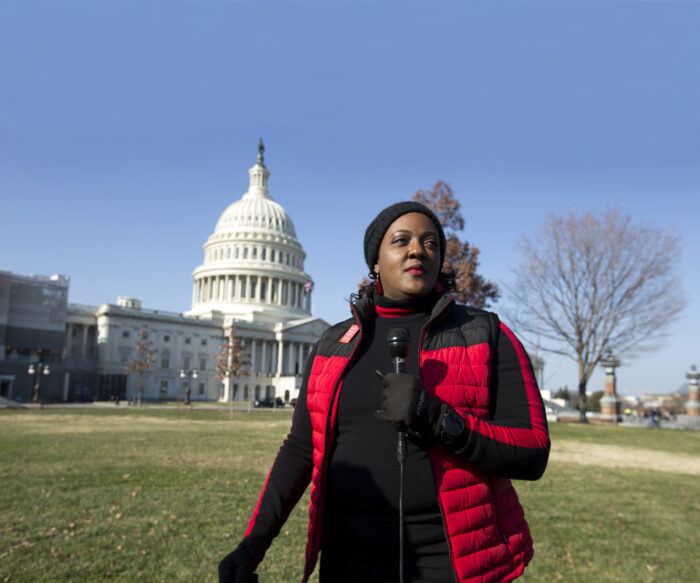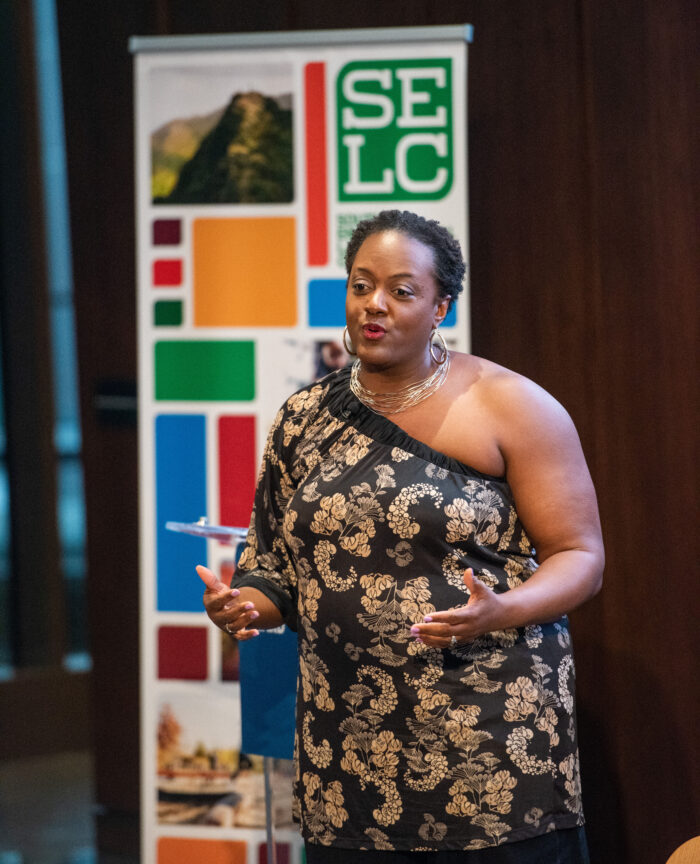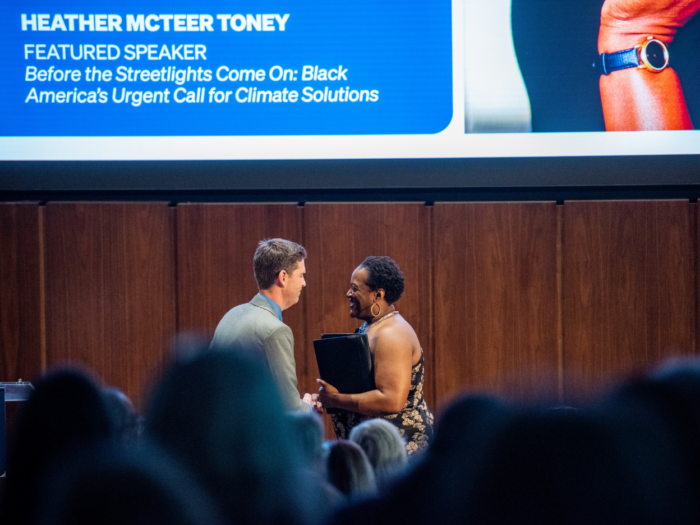Earth Month dialogues: Heather McTeer Toney on Black America’s urgent call for climate solutions
The people most affected by climate change are best suited to lead the movement for climate justice.

That’s a major theme of Heather McTeer Toney’s new book, Before the Streetlights Come On: Black America’s Urgent Call for Climate Solutions, which is out today, just in time for Earth Day.
McTeer Toney is an attorney, politician, inspirational speaker, environmental activist and now author. She served as the first African American, first female, and youngest mayor of her hometown, Greenville, Mississippi, and during that time put McTeer Toney on the path to dedicating her life to environmental justice work. Since then, she’s been on the front lines of the fight with crucial roles at EPA, Mom’s Clean Air Force, and most recently the Environmental Defense Fund.
McTeer Toney’s book is out now. Read our conversation below for her insights into the disproportionate impact of climate change on the Black community and how practicing joy can help us all weather the climate crisis.
Will you explain how the phrase “before the streetlights come on” resonates with you?
As a kid, growing up, it was the warning sign. You didn’t know exactly when it was going to happen, but when it was starting to get dark, the lights would dim and begin to turn on. And it was like, okay, we got to go now or else we’re going to be in some serious trouble.
I think of that with respect to climate change because there are so many indicators telling us: You need to move with urgency, people. We’re seeing it happen now through extreme weather and in how plants and animals are reacting to emissions into the environment.
I think of the streetlights as an indicator, the same type of indicator Mother Earth is giving us to get our stuff together.
Is this extreme urgency for action the main reason you wrote the book?

The driver was both the urgency, but also the hole that I consistently ran into with the lack of Black voices in this space. Even though, to me, they’re everywhere, I couldn’t identify where in the mainstream we’re really elevating the experiences of the Black community with respect to climate and the environment.
In fact, it’s almost the opposite, like there’s a stereotype that Black people don’t care about climate change. And, repeatedly, I found that that was just not true — it was just in a different way that we were experiencing and talking about it. I wanted to expose that because we have so many experiences that show we are solution-driven, and we’ve been constantly solving problems, including those related to the environment and climate. We’ve always acknowledged climate change — we just didn’t call it the same thing.
Research shows that violence increases the hotter it gets. You write so powerfully about how the climate crisis is an accomplice to the murder of George Floyd. What do you want people to know about the links between climate change, extreme weather, and violence?
It will get worse if we do not acknowledge it. I think that was the hardest chapter for me to write. It still gives me chills. When George Floyd died, with his face pressed against the asphalt, the temperature of the asphalt was hotter in that neighborhood than it was in the white neighborhood next door, just because there is more concrete and heat-absorbing materials in low-income communities versus others where there are more trees and spaces that embrace nature.
Creating balance and bringing down the literal temperature of a community in terms of infrastructure and surface space has a direct correlation to bringing down the temperature of how we feel and how we respond to each other.
What happens when you get hot? People get agitated, and they’re more likely to take actions that are violent or harmful in nature. That is not just for police violence, it’s for domestic and child abuse, too, and even the way kids talk to each other in a classroom. If it’s hot, it’s more likely that folks are going to go to the principal’s office.
Southern Black women have been at the forefront of fighting for environmental justice. Why do you think Black Americans, and specifically Black women, are key to making climate progress?
Black women have had to live, breathe, and solve problems in conjunction with what is happening in our environment since we came to this space in 1619. According to The 1619 Project, enslaved Africans had no idea where they were going, but had the wherewithal to take rice seed, sew it into a garment, and braid it into their hair, to bring with them to wherever they were going — to not only connect the space of where they were from, but also to provide nourishment and have some type of connection to the physical ground and the harvests they were familiar with. That was an act of carrying the environment and a promise of the future with them. We benefit today from the different variations of rice and grain that we find in the Carolinas.
Resiliency is in the blood at this point.
Taking people from one ecosystem and transporting them in an extremely traumatic way to a different ecosystem requires them to depend on new plants, animals, germs, etc. Resiliency is in the blood at this point.
What about the dedication to solving climate issues, specifically among young people, inspires and gives you hope?
Their creativity. Young people are able to connect things to climate that I never would have imagined. I’ve seen them turn playing video games into creating what a green economy and clean climate will look like in a virtual space. They are completely tearing up the blueprint of climate-related jobs and industries, saying: Nope, I want to mix climate and fashion. How do we make sustainable shoes? Can I create a skincare line that is non-toxic?
Is there any aspect of SELC’s work that you find particularly compelling?

There’s a stereotype that people in the South don’t care about the environment. SELC is doing the Lord’s work of pushing against that stereotype and helping people see that Southerners want to protect our land and ensure equity and fairness in how people and the environment are treated.
What are you reading right now?
Love Your Mother by Mallory McDuff, which includes women from 50 states talking about their environmental impacts. It’s coming out from Broadleaf Books at the same time my book is, so it was really cool to get an early copy.
I’m also rereading Up From Slavery by Booker T. Washington.
